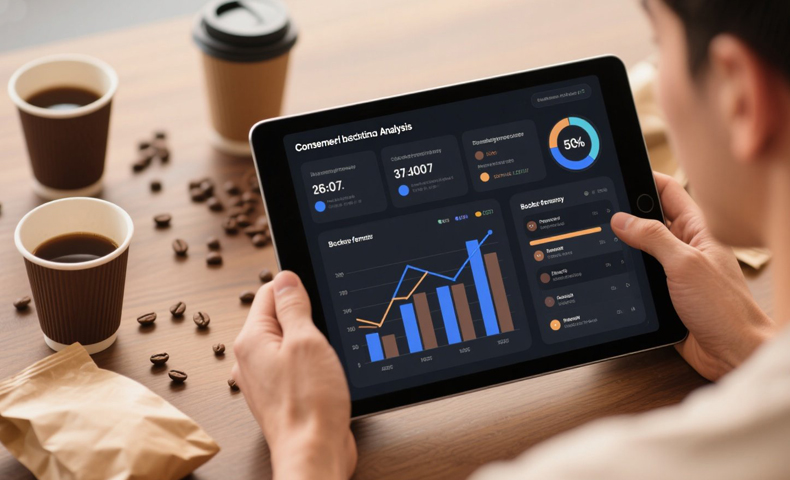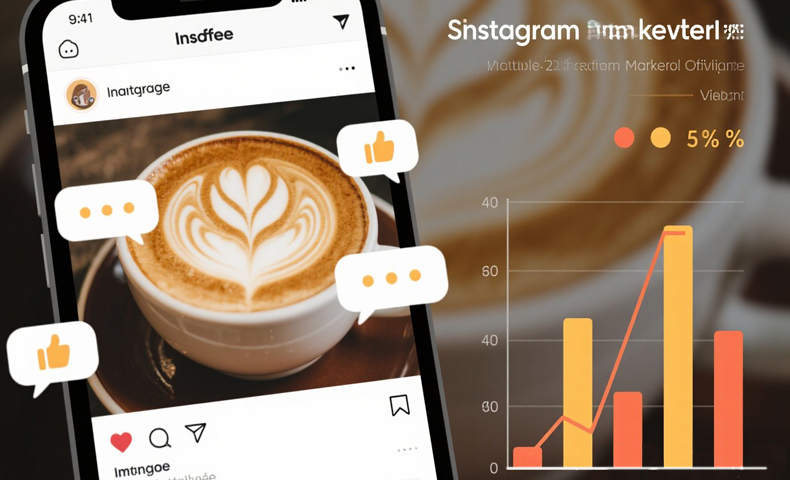How Coffee Brands Leverage Data Analytics to Improve Marketing
Data analytics is transforming the coffee industry, helping brands make better decisions and optimize their marketing strategies. Coffee brands, whether large or small, are increasingly relying on data to understand their customers, refine marketing efforts, and stay competitive in a crowded market. In this article, we will explore how coffee brands use data analytics to improve their marketing and drive success in an increasingly data-driven world.
The role of data analytics in marketing is undeniable. By using data to gather insights into consumer behavior, market trends, and campaign effectiveness, coffee brands can fine-tune their marketing strategies to target the right customers at the right time. With the growing availability of data, coffee brands are able to make smarter, more informed decisions that lead to better marketing results and higher sales.

You might be wondering, how exactly do coffee brands leverage data analytics to improve their marketing? In this article, we’ll dive into the various ways data analytics is used, the tools available to coffee brands, and the impact it has on marketing campaigns.
1. How Do Coffee Brands Use Data Analytics to Drive Marketing Success?
Data analytics provides coffee brands with the insights they need to drive their marketing success. By analyzing customer data and other key metrics, brands can make data-driven decisions that improve their marketing efforts.
Table: Key Ways Coffee Brands Use Data Analytics in Marketing
| Method | Description |
|---|---|
| Understanding Consumer Behavior | Using data to identify purchasing patterns and preferences. |
| Personalized Marketing | Creating campaigns tailored to individual customer needs. |
| Optimizing Campaigns | Tracking performance to adjust and improve marketing strategies. |
By utilizing data analytics, coffee brands can better understand their customers, improve their marketing ROI, and tailor their messages to match consumer preferences. Brands can track customer behaviors such as purchase frequency, location, and time of purchase, which helps them build more effective marketing strategies.
2. What Are the Key Data Analytics Tools Coffee Brands Use?
To effectively use data analytics, coffee brands need the right tools. There are several platforms and tools that can help brands collect, analyze, and interpret their data.
Table: Popular Data Analytics Tools for Coffee Brands
| Tool | Function |
|---|---|
| Google Analytics | Tracks website traffic and consumer interactions. |
| CRM Systems | Helps brands manage customer relationships and analyze data. |
| Social Media Analytics | Analyzes engagement metrics and audience demographics. |
Google Analytics and customer relationship management (CRM) systems are two of the most common tools used by coffee brands to gather insights. These tools provide valuable data that helps brands understand customer preferences, measure the effectiveness of their marketing strategies, and refine their campaigns accordingly.
3. How Does Data Analytics Help Coffee Brands Understand Consumer Behavior?

Understanding consumer behavior is key to successful marketing. Through data analytics, coffee brands can gain valuable insights into how customers make purchasing decisions and what influences their behavior.
Table: Insights Gained from Data Analytics on Consumer Behavior
| Insight | Benefit |
|---|---|
| Customer Preferences | Helps create more personalized offers and campaigns. |
| Purchase Frequency | Allows brands to predict when customers are likely to repurchase. |
| Location-Based Insights | Identifies regional preferences and optimizes distribution. |
Data analytics helps coffee brands understand key aspects of consumer behavior, such as the types of coffee preferred, buying habits, and how often customers make purchases. By leveraging this data, brands can optimize their marketing efforts to align with customer needs and increase conversion rates.
4. How Can Coffee Brands Improve Customer Engagement Using Data?
Engaging customers is essential to building long-term brand loyalty. Data analytics enables coffee brands to engage with their customers more effectively by identifying the best ways to reach them and interact with them.
Table: Strategies for Improving Customer Engagement with Data
| Strategy | Description |
|---|---|
| Targeted Campaigns | Tailoring marketing efforts based on customer data. |
| Personalized Offers | Providing customers with promotions based on their preferences. |
| Real-Time Analytics | Adjusting campaigns based on live data to maximize engagement. |
By using customer data, coffee brands can develop targeted campaigns that reach the right people at the right time. Personalized offers, loyalty programs, and customized messaging can increase customer engagement and drive more sales. Real-time analytics also allows brands to make adjustments during campaigns, ensuring that they optimize performance.
5. How Does Data Analytics Help Coffee Brands Maximize ROI on Marketing Campaigns?
Maximizing return on investment (ROI) is a critical goal for any marketing campaign. Data analytics provides coffee brands with the insights needed to track and measure the effectiveness of their marketing efforts.
Table: How Data Analytics Maximizes ROI for Coffee Brands
| Method | Description |
|---|---|
| Performance Tracking | Measuring campaign success to identify what works. |
| A/B Testing | Testing different versions of campaigns to find the best option. |
| Adjusting Strategies | Modifying campaigns in real time for optimal performance. |
By closely monitoring campaign performance and conducting A/B tests, coffee brands can identify which strategies are most effective at driving sales and engagement. Data analytics helps brands allocate their marketing budgets more effectively, ensuring that every dollar spent is maximized for ROI.
6. How Can Coffee Brands Optimize Their Social Media Marketing with Data Analytics?
Social media is a powerful tool for coffee brands, but it can be challenging to measure success without data analytics. Using social media analytics tools, coffee brands can track engagement, identify top-performing content, and refine their strategies.
Table: Social Media Analytics Tools for Coffee Brands
| Tool | Function |
|---|---|
| Facebook Insights | Measures engagement, reach, and demographics on Facebook. |
| Twitter Analytics | Provides insights into tweet performance and audience engagement. |
| Instagram Insights | Tracks follower growth, post engagement, and content reach. |
Social media analytics tools like Facebook Insights and Instagram Analytics allow coffee brands to track engagement metrics and analyze their audience’s preferences. This data helps brands create more engaging content and adjust their social media strategies to reach their target audience more effectively.
7. How Can Coffee Brands Leverage Data for Email Marketing Optimization?
Email marketing remains a powerful way for coffee brands to reach their audience. By leveraging data analytics, brands can optimize their email campaigns for better performance.
Table: Data Analytics Techniques for Email Marketing
| Technique | Description |
|---|---|
| Personalization | Tailoring emails based on customer data. |
| Segmentation | Creating specific email lists based on customer behaviors. |
| A/B Testing | Testing subject lines and content to determine the best-performing version. |
By analyzing customer data, coffee brands can personalize email content, ensuring it resonates with individual recipients. Segmentation, based on customer behavior and preferences, further ensures that the right message reaches the right audience. A/B testing helps refine email marketing efforts for maximum engagement and conversion.
8. How Does Data Analytics Aid in Competitive Analysis for Coffee Brands?
Understanding the competition is essential for coffee brands to stay ahead in the market. Data analytics helps brands gather insights about their competitors, allowing them to refine their own marketing strategies.
Table: Competitive Analysis Insights from Data Analytics
| Insight | Benefit |
|---|---|
| Competitor Strategies | Understanding competitor marketing efforts and tactics. |
| Market Share Analysis | Identifying market trends and potential opportunities. |
| Product Positioning | Analyzing how competitors position their products in the market. |
Data analytics allows coffee brands to perform competitive analysis by tracking competitor activities, marketing strategies, and consumer responses. This insight helps brands identify opportunities for differentiation and improve their own market positioning.
9. How Can Data Analytics Help Coffee Brands Target Specific Demographics?
By analyzing customer data, coffee brands can identify key demographic groups and tailor their marketing efforts to target these audiences effectively.
Table: Demographic Segmentation for Coffee Marketing
| Demographic Segment | Targeted Marketing Strategy |
|---|---|
| Age Group (18-34) | Use social media and digital ads to appeal to younger audiences. |
| Gender | Tailor marketing campaigns based on preferences and behaviors. |
| Location | Offer region-specific promotions based on local tastes. |
Targeted marketing campaigns based on demographic data allow coffee brands to speak directly to their ideal customers. Whether targeting a younger audience or tailoring offers to specific regions, data analytics helps create highly effective marketing strategies.

10. How Does Data Analytics Improve Content Strategy for Coffee Brands?
Content marketing is vital for coffee brands to engage consumers and drive sales. Data analytics helps coffee brands determine which types of content resonate most with their audience.
Table: Types of Content That Perform Well in Coffee Marketing
| Content Type | Performance Indicator |
|---|---|
| Blog Posts | Increased website traffic and consumer engagement. |
| Videos | High engagement and social shares. |
| Infographics | Visual content that simplifies complex information. |
By analyzing content performance data, coffee brands can determine which content types are the most successful. This data-driven approach allows brands to refine their content strategies, focusing on what truly connects with their audience.
11. How Can Data Analytics Help Coffee Brands Improve Customer Loyalty?
Customer loyalty is crucial to the long-term success of coffee brands. Data analytics helps brands track customer behaviors, understand their preferences, and create targeted loyalty programs to increase retention.

Table: How Data Analytics Improves Customer Loyalty
| Strategy | Description |
|---|---|
| Tracking Retention Rates | Analyzing customer behaviors to measure how often they return. |
| Personalized Rewards | Offering tailored loyalty incentives based on customer data. |
| Identifying At-Risk Customers | Using predictive analytics to identify customers who may stop buying. |
By leveraging data analytics, coffee brands can develop loyalty programs that are more personalized and effective. Brands can track retention rates, tailor rewards to individual preferences, and even use predictive analytics to intervene before a customer churns. This data-driven approach helps brands create stronger, more lasting relationships with their customers.
12. How Do Coffee Brands Utilize Predictive Analytics for Marketing?
Predictive analytics allows coffee brands to anticipate future customer behaviors and market trends, helping them stay ahead of the competition and optimize marketing efforts.
Table: Applications of Predictive Analytics in Coffee Marketing
| Application | Description |
|---|---|
| Forecasting Demand | Predicting when customers are likely to make purchases. |
| Optimizing Inventory | Using data to ensure that stock levels match demand trends. |
| Anticipating Consumer Preferences | Predicting shifts in customer tastes based on data patterns. |
By using predictive analytics, coffee brands can anticipate future demand, optimize inventory, and plan marketing campaigns that align with consumer preferences. This allows brands to be proactive, ensuring they meet customer needs before they even arise.
13. How Can Coffee Brands Use Data Analytics to Improve Product Development?
Data analytics plays a critical role in product development by providing insights into consumer preferences, market trends, and potential product opportunities.
Table: Data-Driven Product Development for Coffee Brands
| Insight | Benefit |
|---|---|
| Consumer Feedback | Using reviews and ratings to refine product offerings. |
| Flavor Preferences | Analyzing trends to create new blends or improve existing ones. |
| Packaging Preferences | Understanding consumer desires for eco-friendly or functional packaging. |
Using data analytics, coffee brands can refine their products based on consumer feedback and behavior. Whether it’s developing a new coffee blend or adjusting packaging, data analytics helps brands stay aligned with consumer demand and market trends.
14. What Challenges Do Coffee Brands Face When Using Data Analytics?
While data analytics offers many benefits, it also presents challenges that coffee brands must address to make the most of their data-driven marketing efforts.
Table: Challenges in Using Data Analytics for Coffee Marketing
| Challenge | Solution |
|---|---|
| Data Quality | Ensuring data accuracy and consistency through proper collection methods. |
| Data Privacy and Security | Adhering to privacy regulations and securing customer data. |
| Data Integration | Overcoming difficulties in merging data from various sources. |
Some of the most common challenges include data quality, data privacy concerns, and difficulties in integrating data from multiple sources. Addressing these challenges is crucial for brands to fully leverage the power of data analytics.
15. What is the Future of Data Analytics in Coffee Brand Marketing?
The future of data analytics in coffee marketing looks promising, with new technologies and trends on the horizon that will continue to reshape the industry.
Table: Future Trends in Data Analytics for Coffee Brands
| Trend | Impact on Coffee Brand Marketing |
|---|---|
| Artificial Intelligence | Automating data analysis and enhancing predictive analytics. |
| Blockchain for Transparency | Using blockchain to provide transparency and traceability in the supply chain. |
| Real-Time Data Analytics | Enabling brands to make instant adjustments to marketing strategies based on live data. |
Emerging trends like artificial intelligence, blockchain, and real-time data analytics are poised to revolutionize the coffee marketing industry. These technologies will allow brands to gain even more detailed insights, automate processes, and enhance their marketing strategies for greater impact.
FAQ Section
Q1: What is data analytics in coffee marketing?
Data analytics in coffee marketing refers to the use of data to track, measure, and analyze customer behavior, sales trends, and marketing campaign performance. It helps brands make informed decisions and optimize their marketing strategies.
Q2: How does data analytics work for coffee brands?
Data analytics works by collecting data from various sources such as customer interactions, sales data, and social media engagement. This data is then analyzed to gain insights into consumer preferences, which can be used to refine marketing efforts.
Q3: Why is customer behavior important for coffee brands?
Understanding customer behavior allows coffee brands to tailor their marketing efforts to match customer preferences, predict future purchasing trends, and create more engaging, personalized campaigns that drive sales and build loyalty.
Q4: How can data analytics improve social media marketing for coffee brands?
Data analytics improves social media marketing by providing insights into engagement metrics, audience demographics, and content performance. Brands can use this data to create more effective campaigns and better connect with their target audience.
Q5: How can predictive analytics benefit coffee brands?
Predictive analytics uses historical data to forecast future trends, helping coffee brands anticipate consumer preferences, optimize inventory, and adjust marketing strategies to stay ahead of the competition.
